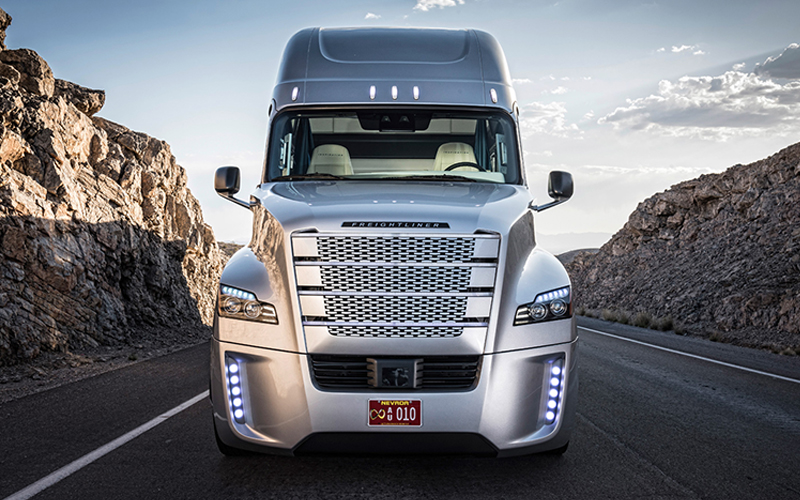Fate of Uber and Otto’s Autonomous Vehicles

Google's Waymo autonomous tech lawsuit against Uber and specifically against Anthony Levandowski, a former Waymo employee who left the company to start autonomous truck driving firm Otto, which Uber purchased for nearly $700 million, looks really bad for Uber.
As reported by Jalopnik, Uber’s year hasn’t gone well.
But it could get much worse, if it ends up on the losing side of a case filed by Google’s self-driving car project, Waymo.
And the case, which alleges Uber’s autonomous driving system designs were created as the result of brazen theft by a former Waymo employee, doesn’t look good for Uber at all.
Uber’s been roiled by one controversy after another - from allegations of sexual harassment, to video evidence of its CEO acting like a jerk, to the alleged use of a tool in the ride-hailing company’s app specifically aimed at subverting regulators - but it’s the lawsuit filed last month by Waymo that’s currently front-and-center.
The suit, in essence, asserts that Uber’s future is grounded by self-driving system designs that were stolen by Anthony Levandowski, a former Waymo employee who abruptly left the company in January 2016 to start an autonomous truck driving firm, Otto, which was later purchased by Uber for nearly $700 million.
Read: A note on our lawsuit against Otto and Uber - Waymo Team
According to the complaint, between November 2015 and January 2016, before leaving Waymo, Levandowski downloaded nearly 10 GB of design files - about 14,000 in all - and left the company.
Uber may have a defense to mount in court, thanks to the quiet purchase of a small autonomous tech firm in 2016 by Otto.
But a more complete timeline of Levandowski’s involvement with Uber has emerged in recent weeks - and it doesn’t look particularly good for the ride-hailing start-up.
The most recent report comes from Bloomberg Businessweek, which goes into exceptional detail behind the case and is well worth a read.
But there’s a few documents that appear to significantly bolster Waymo’s case, stemming from new documents entered by the Google self-driving project in court.
In particular, the written testimony of Pierre-Yves Droz, the co-founder of 510 systems (a smaller tech-firm founded also by Levandowski), stands out.
Here’s Pierre-Yves Droz:
Mr. Levandowski personally told me in January 2016 he was interested in implementing long-range LiDAR at his new company and was thus interested in the [REDACTED] design which is not available in any commercially available LiDAR system that I know of. I distinctly remember taking a walk around our Mountain View office one-on-one with Mr. Levandowski on or around January 5, 2016. During this walk, he told me specifically that he wanted his new company to have a long-range LiDAR, which is very useful for self-driving truck applications he was interested in. He also told me that he planned to “replicate” this Waymo technology at his new company.
Levandowski resigned from Waymo on January 27, 2016.
More from Pierre-Yves Droz:
This conversation did not surprise me. Mr. Levandowski had previously told me, in or around the summer of 2015, that he had talked with Brian McClendon, an Uber executive involved with their self-driving car project. We were having a dinner at a restaurant near the office, and he told me that it would be nice to create a new self-driving car startup and that Uber would be interested in buying the team responsible for the LiDAR we were developing at Google.
Recode also reported this week that Levandowski apparently started working for Uber much sooner than anyone previously knew.
Uber CEO Travis Kalanick, according to Recode, hired Levandowski as a consultant to Uber’s self-driving car project just weeks after he left Waymo to start Otto, which officially formed Feb. 1, 2016. Levandowski was spotted at Uber’s Pittsburgh office that same month, Recode says.
Read: The Inaccuracy of the Term “Uber for Trucking”
To put it lightly, that’s strikingly weird. In what’s supposedly a billion-dollar race to constructing efficient, safe self-driving vehicles, Levandowski was actively working for someone who was supposed to be a competitor? Why? Uber didn’t officially purchase Otto until August 2016.
A more detailed timeline of the situation has been compiled here. But overall, the case has the potential to derail Uber’s self-driving endeavor, and soon, if a federal judge overseeing the case agrees that Waymo’s suit warrants issuing a preliminary injunction.
Uber has until April 7 to respond to Waymo’s request for the injunction, which would prevent the company from using the allegedly stolen self-driving tech while the case proceeds.
Source: Jalopnik
Read: Uber Plans to Take Waymo Self-Driving Car Tech Theft Case to Arbitration
Related: Truckers Prepare For Era of Driverless Trucks
Article Topics
Google News & Resources
New Google last mile offerings focus on smoothing out processes for fleet operators Google taps project44 to be initial real-time visibility provider for supply chain platform Google selects project44 as first real-time visibility provider for Google Cloud Supply Chain Twin Report highlights Google’s increasing focus on logistics CRAV.ai conference highlights collaborative robots, advanced vision and artificial intelligence Other Voices: The promise of vision picking hinges on smart engineers and processes Walmart Teams Up With Google to Take On Amazon More GoogleLatest in Transportation
Talking Supply Chain: Doomsday never arrives for Baltimore bridge collapse impacts Amazon Logistics’ Growth Shakes Up Shipping Industry in 2023 Nissan Channels Tesla With Its Latest Manufacturing Process Why are Diesel Prices Climbing Back Over $4 a Gallon? Luxury Car Brands in Limbo After Chinese Company Violates Labor Laws The Three Biggest Challenges Facing Shippers and Carriers in 2024 Supply Chain Stability Index: “Tremendous Improvement” in 2023 More Transportation














